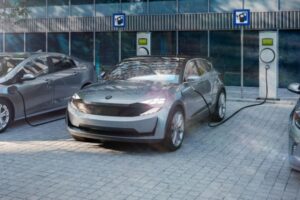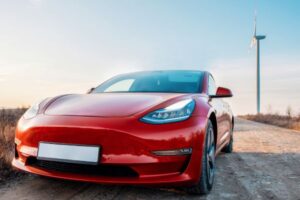The automotive landscape is on the cusp of a monumental transformation, driven by the convergence of electric mobility and artificial intelligence (AI). Within this dynamic paradigm, electric sports cars emerge as the vanguards of change, seamlessly blending high-performance thrills with sustainable and intelligent driving experiences. As AI technologies continue to evolve and permeate every aspect of modern life, their role in the future of electric sports cars becomes ever more significant. This comprehensive article delves into the pivotal role of AI in shaping the future of electric sports cars, exploring the technological advancements, autonomous capabilities, and the boundless possibilities that await on the roads of tomorrow.
Electric sports cars have embarked on an electrifying journey, redefining the very essence of motoring. The power and efficiency of electric motors, coupled with AI-driven innovations, create a harmonious marriage of exhilarating performance and eco-conscious driving. With instant torque at their disposal, electric sports cars offer breathtaking acceleration, propelling drivers from standstill to blistering speeds with unparalleled efficiency. The seamless and instantaneous power delivery, thanks to AI, eliminates any lag, providing an immediate and visceral response to the driver’s input, resulting in an adrenaline-fueled experience that captivates both seasoned enthusiasts and new adopters of electric sports cars.
Beyond the realm of raw power, AI’s influence extends to the realm of advanced driver assistance systems (ADAS) that enhance safety, situational awareness, and driver convenience. The interplay of AI-driven sensors, cameras, and machine learning algorithms equips electric sports cars with features such as adaptive cruise control, lane-keeping assist, and automated emergency braking. This intelligent symbiosis of AI and electric sports cars exemplifies the future of high-performance motoring, where intelligence and exhilaration intertwine on the open road. In the pursuit of autonomous driving, AI technologies are propelling electric sports cars towards higher levels of autonomy, offering passengers unprecedented convenience, productivity, and relaxation during their journeys.
The future of electric sports cars holds the promise of enhanced connectivity, a realm where AI-driven infotainment systems seamlessly integrate with smartphones, wearable devices, and other smart gadgets, offering drivers and passengers a connected ecosystem of digital services and entertainment options. Voice-controlled interfaces and natural language processing enable intuitive interactions with the infotainment system, allowing drivers to access navigation, control music, and manage various vehicle functions with simple conversational commands. Moreover, AI-driven connectivity fosters vehicle-to-vehicle (V2V) and vehicle-to-infrastructure (V2I) communication, enabling electric sports cars to interact with other vehicles and the surrounding environment, ensuring that drivers stay informed and make informed decisions during their journeys. The seamless integration of AI-driven connectivity into electric sports cars creates a holistic and immersive driving experience, where technology enhances every moment behind the wheel. As the automotive industry embraces the electric mobility revolution, the design of electric motors emerges as a trailblazing force, reshaping the future of sports cars and paving the way for a thrilling and sustainable era of high-performance motoring.
Advanced Driver Assistance Systems (ADAS)
AI-driven Advanced Driver Assistance Systems (ADAS) lie at the core of the future of electric sports cars. Leveraging an array of sensors, cameras, and machine learning algorithms, ADAS enhances safety, situational awareness, and driver assistance. These systems offer a range of features, including adaptive cruise control, lane-keeping assist, and automated emergency braking, providing drivers with an added layer of protection and convenience.
In electric sports cars, ADAS optimizes performance and safety, allowing for seamless integration of electric powertrains and autonomous capabilities. By analyzing real-time data from various sensors, ADAS systems can optimize energy efficiency, adjust power distribution, and assist drivers in dynamic driving scenarios. This harmonious synergy between AI and electric sports cars exemplifies the future of high-performance motoring, where intelligence and exhilaration intertwine on the open road.
Autonomous Driving and Level of Autonomy
AI plays a transformative role in the journey towards autonomous driving in electric sports cars. The future of these vehicles holds the promise of higher levels of autonomy, where drivers can relinquish control and embrace the joys of a connected and efficient journey. From Level 3 conditional automation to Level 4 high automation and Level 5 full automation, electric sports cars are progressively advancing towards fully autonomous capabilities.
As AI-driven autonomous systems evolve, electric sports cars will become intelligent companions, capable of navigating complex driving scenarios, anticipating road conditions, and ensuring seamless communication with other vehicles and infrastructure. The integration of autonomous driving in electric sports cars redefines the concept of mobility, transcending traditional driving paradigms and ushering in an era where passengers can experience unprecedented convenience, productivity, and relaxation during their journeys.
Predictive Maintenance and Performance Optimization
AI-driven predictive maintenance is set to revolutionize electric sports cars’ reliability and performance. With the ability to analyze vast amounts of data in real-time, AI algorithms can predict potential faults or failures before they occur, enabling proactive maintenance and minimizing downtime. By identifying wear and tear patterns, AI optimizes maintenance schedules, reducing operational costs and maximizing the longevity of critical components.
Furthermore, AI-driven performance optimization enhances the driving experience of electric sports cars. By continuously analyzing driving behavior, weather conditions, and road terrain, AI can dynamically adjust power output, torque distribution, and suspension settings to suit the driver’s preferences and the road conditions. This level of personalized performance optimization elevates the driving experience to new heights, ensuring that every journey in an electric sports car is tailored to the driver’s desires.
Enhanced Connectivity and User Experience
AI-driven connectivity is set to transform the user experience in electric sports cars. AI-powered infotainment systems seamlessly integrate with smartphones, wearable devices, and other smart gadgets, offering drivers and passengers a connected ecosystem of digital services and entertainment options. Natural language processing enables intuitive voice control, allowing drivers to interact with the infotainment system, access navigation, control music, and manage various vehicle functions with simple conversational commands.
Moreover, AI-driven connectivity fosters vehicle-to-vehicle (V2V) and vehicle-to-infrastructure (V2I) communication, enabling electric sports cars to interact with other vehicles and the surrounding environment. Real-time traffic updates, weather forecasts, and road condition alerts ensure that drivers stay informed and make informed decisions during their journeys. The seamless integration of AI-driven connectivity into electric sports cars creates a holistic and immersive driving experience, where technology enhances every moment behind the wheel.
AI in Performance Data Analysis and Training
AI is revolutionizing performance data analysis and training in electric sports cars, optimizing driving techniques and pushing the limits of performance. AI algorithms can process and interpret telemetry data from track sessions, providing drivers with valuable insights into their driving behavior, lap times, and areas for improvement. This data-driven approach empowers drivers to refine their skills and push their electric sports cars to new levels of performance.
AI-driven virtual driving coaches offer personalized training, tailoring guidance and feedback based on individual driving styles and skill levels. By analyzing data from previous driving sessions, AI can create personalized training programs, suggesting specific areas to focus on and providing real-time feedback during track sessions. This AI-driven training approach not only enhances driver performance but also fosters a sense of camaraderie among electric sports car enthusiasts, as they share insights and experiences in their pursuit of driving excellence.
Conclusion
The role of AI in the future of electric sports cars is pivotal, redefining the landscape of high-performance motoring. From advanced driver assistance systems and autonomous capabilities to predictive maintenance and performance optimization, AI empowers electric sports cars with unparalleled intelligence and efficiency. The seamless integration of AI-driven connectivity enhances the driving experience, creating a connected and immersive ecosystem within the vehicle. Furthermore, AI’s impact extends beyond the driving experience, revolutionizing performance data analysis and driver training, fostering a community of electric sports car enthusiasts who strive for driving excellence.
As the automotive industry accelerates towards a sustainable and intelligent future, electric sports cars exemplify the synergy between AI and high-performance motoring. The future of electric sports cars embraces the promise of electrifying acceleration, autonomous driving, and personalized experiences, all powered by AI-driven innovation. The road ahead is paved with boundless possibilities, where the fusion of AI and electric sports cars shapes an electrifying and intelligent driving experience, destined to captivate the hearts of driving enthusiasts and pave the way for a thrilling and sustainable era of high-performance motoring.



